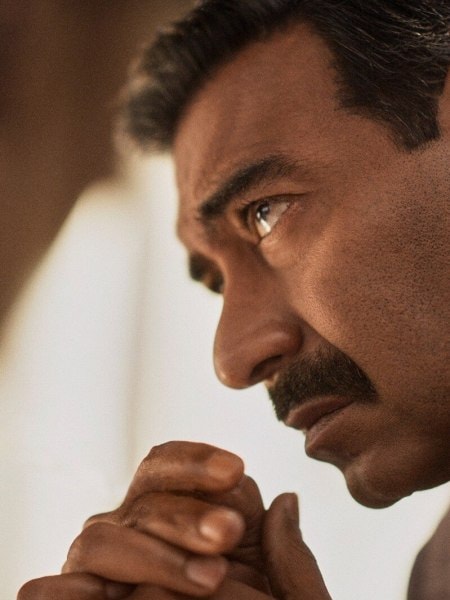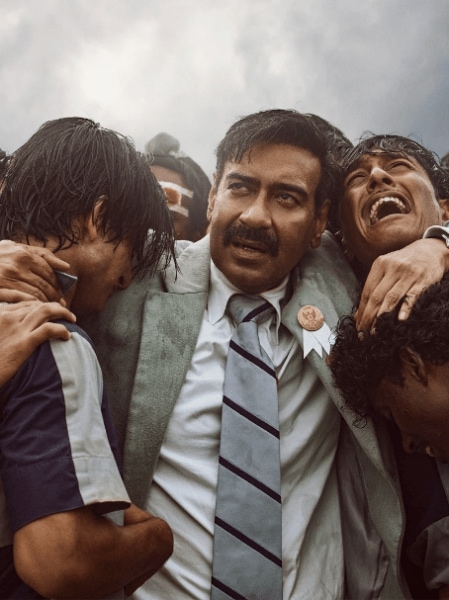[ad_1]
Boney Kapoor would probably not agree, but it’s sort of serendipitous that Maidaan — a movie that had a catastrophic theatrical run not too long ago — debuted on streaming after the elections. Perhaps now, its themes of nation-building and unity can be appreciated properly, because back in April, it couldn’t help but feel like the movie was selling a pipe-dream. How could one man go on a countrywide quest to blur the lines between caste, religion, and culture, while also defending the idea of democracy and collecting critical allies in one fell swoop? It all seemed outlandish mere weeks ago, but now, Maidaan offers something more meaningful than generic sports drama; it offers catharsis.
Directed by Amit Ravindernath Sharma, Maidaan stars Ajay Devgn as Syed Abdul Rahim, the influential football coach who led the Indian team to its golden era back in the 1950s and ‘60s. During this time, India delivered unprecedented results at the Olympics and the Asian Games, results that it hasn’t been able to replicate since. Rahim — a one-man army of sorts — faced pushback from corrupt bureaucrats who were in cahoots with egotistical journalists, as he endured personal attacks in the press and, in the most pivotal moment of his career, was ousted from the very institution that he’d sworn to serve. Doesn’t that ring a bell?
 Ajay Devgn in a still from Maidaan.
Ajay Devgn in a still from Maidaan.
After a crushing defeat at the hands of the former Yugoslavia at the 1952 Olympics, Rahim puts his foot down and calls for a complete restructuring of the team. Instead of fielding ‘star players’ — read, ‘varishth netas’ — he announces that he will go on a Bharat Jodo Yatra of sorts, to get a glimpse of the real India and discover new grassroots talent. On his travels, Rahim comes across contenders from all corners of the country; young men hungry to prove themselves. There’s a Dalit man who survives on tea and biscuits but can dribble the ball better than anybody else; there’s a ‘sardarji’ with the stamina of a horse; a Bengali who can strike the ball with such force that it rips a hole through the net. India, Rahim confirms, contains multitudes. The whims and fancies of an entitled few do not represent the real people.
“Jo team hum yahan banane jaa rahe hain woh tumhari yah meri team nahi, desh ki team hai,” he says in one scene, as the pressure to perform mounts. Rahim’s main adversary is a journalist named Roy Choudhary, a one-note villain who holds a grudge against him for not giving West Bengal — or, more accurately, Kolkata — proper representation in his ‘ministry’. And so, Roy Choudhary goes on a personal rampage against Rahim; he doesn’t restrict himself to libellous articles in the newspaper, but goes so far as to sabotage his operation from the sidelines. It makes sense that Gajraj Rao plays him like a Batman villain, but Roy Choudhary is probably only a bitter middle-aged man with a failed football career behind him.
Maidaan suggests that the biggest hurdles in the path to success are often presented by one’s own compatriots. Out there on the field, there are rules; there are gentlemen’s agreements; there’s sportsmanship. But outside it, in the real world, it’s utter lawlessness. A scene in which Rahim is voted out by the football federation at the behest of a newly appointed (and grossly corrupt) chief can be viewed, superficially, as a homage to a similar scene in Steve Jobs, where the titular pioneer was booted out of his own company by the board of directors. But cultural context is to experiencing art what a nose is to eating food. And because of recent events, one can’t help but draw parallels between what happened to Rahim, and the unfairness with which Rahul Gandhi was disqualified as an MP.
And it is all done in the guise of democratic process. The weaselly new villain, Shubhankar, calls for a show of hands to remove Rahim as coach after highlighting his many ‘failures’ as a leader — his insubordination, his borderline narcissism, the lack of ‘results’ under his stewardship. But if ‘democracy’ could be manipulated against him, it could also be relied on to reinstate Rahim as well. Later in the movie, he finds an ally in the board, an ally who makes a case on his behalf to the same people who voted him out of power. “Jinhe lagta hai ke Indian football ke liye itna karne waalo ko ek akhri mauka dena banta hai, toh please raise your hands. Main apni rai thopna nahi chah raha hoon,” Rahim’s friend says, before adding with a sly smile, “Democracy ke zariye faisla hona chahiye.”
 Ajay Devgn in a still from Maidaan.
Ajay Devgn in a still from Maidaan.
Maidaan is filled with melodramatic moments such as this. It is, after all, a movie whose protagonist literally almost dies on the pitch, as he watches his disciples honour his legacy while AR Rahman wails in the background. In that moment, Rahim’s Jesus arc is complete. But Maidaan is a chore otherwise; for a movie directed by Sharma — the filmmaker is known for his economical storytelling in ads — it’s laboriously constructed and incredibly repetitive. There’s little forward momentum; Maidaan is technically refined, but dramatically inert. Nearly every character, including Rahim, is two-dimensional. It’s no The Damned United; nor is it Chak De! India. The movie can only be appreciated when you impose a deeper meaning onto it. But mercifully, Sharma has the good sense to invite audience participation; to inspire conversation around politics and secularism, the untapped power of the common person, and the unchecked villainy of elected officials.
Shubhankar’s philosophy in life can be summed up by a quick line of dialogue. “Achcha khel ke haarne se behtar bura khel ke jeetna hai (It’s better to win by playing ugly than to lose by playing fair),” he says. But there’s a difference between empty applause and genuine admiration. In Maidaan, the Indian team scores its most crucial victory not at the end, but just before the interval, when it forces the mighty French to a 1-1 draw that gives them the confidence to fight another day. If you squint hard enough, the scoreboard seems to read 293-234.
Post Credits Scene is a column in which we dissect new releases every week, with particular focus on context, craft, and characters. Because there’s always something to fixate about once the dust has settled.
Click for more updates and latest Bollywood news along with Entertainment updates. Also get latest news and top headlines from India and around the world at The Indian Express.
[ad_2]





